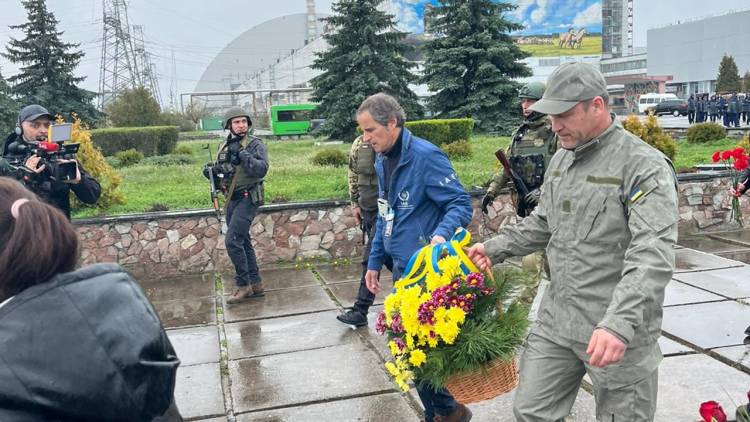The IAEA will continue to support Ukraine in ensuring the safety and security of its nuclear sites, IAEA Director General Rafael Mariano Grossi told Ukraine President Volodymyr Zelensky this evening during a meeting in Kyiv. Mr Grossi is in Ukraine heading an assistance mission to deliver vital equipment and conduct radiological and other assessments at the Chornobyl Nuclear Power Plant, which was held by Russian forces for five weeks before they withdrew on 31 March.
"It was an emotional day to be in Chornobyl and remember the tragic events of 1986," he said. "At the same time, it is an honour to be here with President Zelensky and show our support. The IAEA will continue to support Ukraine," Mr Grossi said.
President Zelensky thanked the Director General for visiting Chornobyl and the continued support the IAEA has provided to Ukraine and its nuclear regulator. The IAEA has been in increasingly close communication with the regulator since Russian forces advanced into Ukraine on 24 February.
The IAEA has released updates on nuclear developments in Ukraine daily since then and distributed them on social media in all UN languages and Ukrainian. The IAEA has also been on the ground at other Ukrainian power plants during the conflict, and last month Mr Grossi visited the South Ukraine Nuclear Power Plant to offer technical assistance for safety and security to the country's nuclear facilities.

Director General Rafael Mariano Grossi told President Zelensky that the IAEA will continue to support Ukraine in ensuring the safety and security of its nuclear sites.
Equipment and praise for Chornobyl
In the afternoon, Mr Grossi visited the Chornobyl Nuclear Power Plant and delivered specialized safety security equipment to the site.
He met with staff at the power plant and thanked them for their resilience and courage during what has been an extremely difficult time of conflict. Mr Grossi praised the workers' continued efforts while under Russian occupation: "We do not only have respect for you we have admiration for you because you did exactly what you were expected to do. You showed professionalism, courage, and of course, patriotism. But you did the right thing so don't worry, we are here, the IAEA is going to stay."

IAEA Director General paid respect to the victims of the 1986 Chornobyl Nuclear Power Plant Accident. (Photo: D. Candano/IAEA)
Mr Grossi's visit to Chornobyl coincided with the anniversary of the nuclear accident that occurred there on this day in 1986. He paid tribute to the lives lost at the accident and laid a wreath of flowers at its memorial. "I'm here to pay respect to the victims of the nuclear accident and to all those who work tirelessly to rebuild and protect this place," Mr Grossi said
The 1986 accident is the most severe in the nuclear power's history and was caused by improper testing at low power, leading to a loss of control, an explosion and a fire that demolished the reactor building and released large amounts of radiation into the atmosphere.






